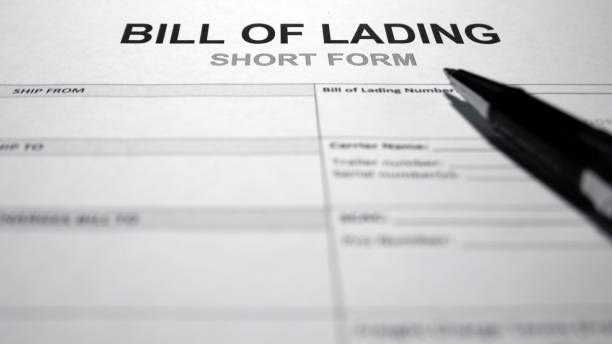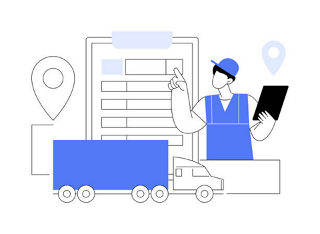What is a Bill of Lading? – Benefits, Importance, and Purpose

You have probably started a business that requires shipping products to your customer. Moving along, everything works well, and you are enthusiastic about shipping your first order.
But suddenly, the word “Bill of Lading” pops up in the process, and you are confused with – what is it?
The shipper you choose asks you to provide them with the bill of lading. They inform you they can’t move ahead without it. In simple terms, it is a must to complete this shipment.
If you want an answer to this question, keep reading to unfold all the details you need about the bill of lading.
What is a Bill of Lading?

Whenever you ship products, a formal document is prepared, ensuring delivery to the accurate destination. This document is known as the Bill of Lading.
A bill of lading is a legal document that states an agreement between the carrier and the shipper. It consists of details of the good, including type, quantity, and destination. Initially, the document is prepared by the owner of the goods and then signed by the carrier while picking up the shipment. This signature acknowledges that the shipping package is onboard the carrier.
Furthermore, when the shipment recipient signs the document, it confirms that the goods have been received.
What is Included in the Bill of Lading?
The bill of lading includes numerous information about the goods being shipped, which further includes;
- Date of shipment.
- Purchase order number.
- Shippers’ details like name and address.
- Recipient’s name and address.
- Value Of Goods.
- A number of units of goods.
- Description of what’s being shipped.
- Type of packaging – Crates, Pallets, Cartons, etc.
- The exact weight of goods.
- In-depth pickup or delivery specification
Besides these, there can be numerous other details depending on the nature of the goods and the shipment’s location.
Types of Bills of Lading

Before making a bill of lading, it is essential you know the types of bills of lading. This will help you make the most appropriate document per your needs. Some common types of bills of lading include;
- Straight Bill of Lading
- Order Bill of Lading
Let’s discuss them in detail:
1. Straight Bill of Lading
When a customer pays in advance for the goods, a straight bill of lading is used throughout the delivery process. This bill ensures the safe and timely delivery of the goods to the correct address.
2. Order Bill of Lading
The carrier is obliged to carry the order bill of lading when the payment is not made in advance. It is considered a negotiable instrument, which means it acts as a substitute for money or as a promise to pay.
What is the Purpose of a Bill of Lading?

As of now, you might be well-versed with what a bill of lading is and its types; let’s discuss its different purposes.
The bill of lading has three primary purposes or functions, including;
1. Evidence of Contract of Carriage
The primary function of the bill of lading is to act as evidence of the contract of carriage between the shipper and carrier. This ensures that the goods are transported to recipients without any barriers. For example, if you ship goods with a bill of lading, the document ensures that everyone in the process, including the carrier and recipient, is entitled to process it further or receive it.
2. Recipient of Goods
Once the goods are ready to ship, the shipper provides the bill of lading to carrier, who signs on it. Moreover, once the carrier signs the bill of lading, it acts as proof.
This means the bill of lading is proof that the carrier has received the goods from the shipper in top condition with all the details incorporated. Moreover, the carrier is known to be responsible for further processing.
3. Document of Title to the Goods
Although it reads confusing, a document of title to goods means a written description of goods, which is evidence that the person possessing it is entitled to receive, hold, or dispose of it.
In easier language, it means the bill of lading decides who owns the title of the goods based on the type of goods shipped.
Why is Bill of Lading Important?
Whenever any goods are shipped, the major problem faced in the process is delivering the shipment to the wrong address or person or delayed delivery. The major reason behind this is the unavailability of all the details of the goods and their recipient.
This is where the importance of bill of lading comes into play.
Such a bill provides the carrier and the shipper with all the necessary details about the goods to help them accurately process the shipment. In case anything misses out during the shipment of goods, the bill of lading can also be used in litigation.
Moreover, it clearly defines and segregates the duties of everyone involved in the shipping process. This implies it works as undisputed proof of shipment.
What are the benefits of a Bill of Lading?

Using a bill of landing while shipping goods has numerous benefits, including;
1. Process Optimization
Traditional shipping processes can lead to missing management of the shipping goods or even losing the goods between the process. But using a bill of lading optimizes the whole process by providing all the details about the goods to be shipped. These details clearly define the duties of all the people, including the shipper, carrier, and receiver.
2. Immediate Information
With a bill of lading, everyone can immediately access information about goods and shipping details. This information can be used to eradicate any issues coming up on the spot.
3. Transparency
With detailed information about the goods to be shipped, the bill of lading keeps the whole process transparent. Everyone in the shipping process knows the product well, its destination, shipper, and carrier, making it easier to process.
Conclusion
If you want to streamline the shipping process and ensure the goods are processed accurately, the bill of lading is necessary. It will not only ensure accurate delivery but will also help in providing better service to your customers. This, in turn, will increase your sales and build more customer trust.

